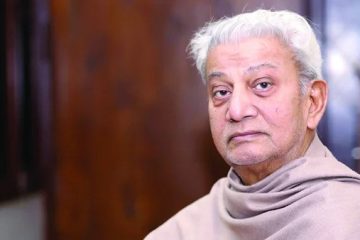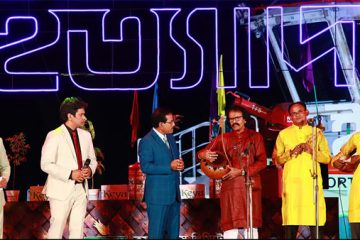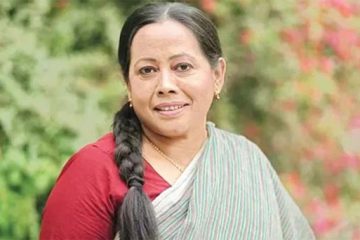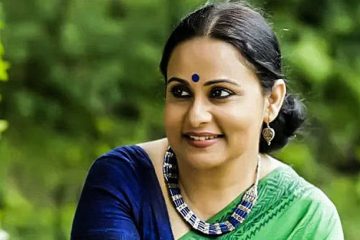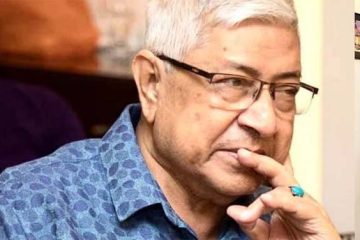 Mahfuz Ahmed is one of the most popular actors in the Bangladeshi TV media. He has personified diverse characters throughout his extended acting career. The deft actor has gone behind the camera and directed TV plays and serials as well. He has acted in films too and won a National Film Award for his performance in “Lal Sabuj”. “Choita Pagol”, a serial directed by him, has become very popular among the audiences; Mahfuz plays the protagonist in it. Recently, this busy actor-director was the featured guest at DS Café, and spoke to his fans over the phone and Star Arts & Entertainment.
Mahfuz Ahmed is one of the most popular actors in the Bangladeshi TV media. He has personified diverse characters throughout his extended acting career. The deft actor has gone behind the camera and directed TV plays and serials as well. He has acted in films too and won a National Film Award for his performance in “Lal Sabuj”. “Choita Pagol”, a serial directed by him, has become very popular among the audiences; Mahfuz plays the protagonist in it. Recently, this busy actor-director was the featured guest at DS Café, and spoke to his fans over the phone and Star Arts & Entertainment.
The Daily Star (TDS): How is the serial “Choita Pagol” progressing?
Mahfuz: We are at the final stage of the serial. The plot is thickening over a relationship. The story focuses on the struggles and hardships a young widow faces in a rural setting.
TDS: What makes this serial different from your other plays?
Mahfuz: Usually most of the plays/serials with a rural storyline are set in the same area. They always have Shaal and Gojari trees, and it seems like the entire country looks like that. Majority of these plays are shot in Pubail. “Choita Pagol” has been shot in Munshiganj, Bikrampur and the banks of Padma. I grew up in a village and know what a real village looks like.
Another feature that sets the serial apart is the use of Noakhali dialect — moving away from the usual Pabna and Kushtia lingo that is widely used in TV plays. We also didn’t cast actors who are originally from the Noakhali region. So, the language the actors are using on the serial is not hardcore Noakhali dialect; it’s uncomplicated enough for everyone to understand. I didn’t compromise on quality.
A journalist, London: Which is your dream role? Acting opposite which actress gave you the most satisfaction?
Mahfuz: My dream role — which will probably remain a dream — is Amit from Rabindranath Tagore’s “Shesher Kobita”. Several attempts were taken to film the story. Shomi Kaiser and I were cast as Labanyo and Amit for a Bangladeshi production. We rehearsed for two months. The more we rehearsed, the more the role seemed elusive. That project was scrapped. Later, producers in Kolkata made another attempt, but I lacked the courage. The more I read “Shesher Kobita”, the role [Amit] seems harder to portray. I feel that I may do injustice to Amit’s character.
As for your second question, Aupi Karim, Tarin and Joya Ahsan are very talented actresses who I love working with. I have done many plays with these three actresses. I acted opposite Joya in an Arun Chowdhury production called “Kagojer Phul” this was way before she became the “Joya Ahsan”. I also had many acting opportunities opposite Aupi and Tarin, on both single-episode plays and serials. Also, one of my most memorable experiences has been working with Rupa Ganguly. I worked with her on an India-Bangladesh joint production, which was aired on Ekushey Television.
TDS: Who is your favourite director?
Mahfuz: Giasuddin Selim tops that list. He has the ability to bring out the character from inside an actor. He is a director who helps the actors see things from other perspectives. I admire Mostofa Sarwar Farooki’s work too. I acted in some of his earlier works like “Shoro Borno Theatre”, “Ekannoborti”, “Balok Balika”. Farooki also has the ability to interpret a character and convey his ideas to the actor.
Sagar Chowdhury, Syhlet: You used to be a journalist. How did you get into the world of acting?
Mahfuz: Everyone has to begin somewhere. I chose journalism. And no, I never had any aspiration about acting. It just happened.
TDS: Did you find any difference between acting in a TV play and acting for the silver screen?
Mahfuz: When doing a movie, we try to maintain some of the same techniques applied in TV productions. On stage, a lot of expressions are needed. We need to tone it down a bit for the TV and further lessen it for films, as overacting during a close shot of the face may ruin the scene. So the approaches are different.
Himel, Narayanganj: How many episodes will “Choita Pagol” have?
Mahfuz: The serial will run 130 episodes.
TDS: Do you think the recent daily soap trend is an imitation of what’s become popular in our neighbouring country?
Mahfuz: Sadly, we are easily influenced by foreign trends, whether it is clothes or culture. Daily soaps have gained popularity on Indian channels, but it won’t survive on our TV, as this doesn’t really represent our culture or us.
TDS: But “Shokal Shondha” followed this trend and was a huge success…
Mahfuz: Yes, because “Shokal Shondha” incorporated true Bangladeshi elements into that format and was not a blind imitation. It takes skills to produce something like that.
Mehedi, Rajshahi: It’s very exciting to be speaking to you. I’m a huge fan.
Mahfuz: I’m also glad to be talking to you. Take care of yourself.
TDS: Why did you decide to take up direction?
Mahfuz: I did it to take some time off from acting. Actor Mahfuz Ahmed and the individual Mahfuz have both benefited from it. If acting remained my only source of income, I would have been forced to take up any offer. But the director Mahfuz Ahmed will add longevity and value to my acting résumé.
Mahmud Manzur, Eskaton, Dhaka: When do you plan to direct a movie? “Choita Pagol”, “Nurul Huda” and other plays directed by you have revealed your directorial talents.
Mahfuz: Your words are very encouraging. However making something for the TV and for the silver screen are two very different things. So far I’ve done well with TV plays, but that might not be the same case for movies. However, like everyone else I have a dream of directing a film. But I want to make it for the masses, and not just for film festivals.
Tarek, Jamalpur: I’m a huge fan. I watch all of your plays regularly, along with “Choita Pagol”.
Mahfuz: Thank you for calling from Jamalpur. Keep watching “Choita Pagol”.
Shonali, Uttara, Dhaka: Can you sing a song from the film “Lal Sabuj”?
Mahfuz: I wish I could, but I can’t sing. Thank you for calling.
Lonny, Banani, Dhaka: Which district are you originally from?
Mahfuz: Noakhali.
Nazmul, Singapore: I love your acting.
Mahfuz: Thank you for calling. I hope you do well on foreign soil.
Courtesy ofThe Daily Star


